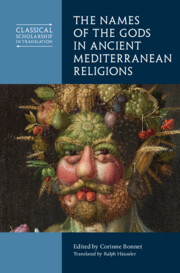Book contents
- The Names of the Gods in Ancient Mediterranean Religions
- Classical Scholarship in Translation
- The Names of the Gods in Ancient Mediterranean Religions
- Copyright page
- Dedication
- Contents
- Figures
- Tables
- Contributors
- Acknowledgements
- Foreword
- Abbreviations
- Introduction In the Mirror of Vertumnus
- Chapter 1 ‘To the Immortals Everything Is Possible’
- Chapter 2 All Sides of the Moon
- Chapter 3 ‘May the Force Be With You!’
- Chapter 4 Dionysos in the Mirror of Poseidon
- Chapter 5 Lord of the Universe, the World and Eternity
- Chapter 6 This Is Not a Name
- Chapter 7 The Sword and the Patera
- Chapter 8 A Travelling Portrait
- Chapter 9 Pantheus, a ‘Total’ God in the Greek and Roman World
- Chapter 10 ‘I Will Be Who I Will Be’ (Exod. 3:14)
- Chapter 11 Golden Locks Among the Greeks, or the Hair Secrets of the Beautiful Apollo
- Chapter 12 Athena – Artemis
- Epilogue
- Bibliography
- Index
Epilogue
Published online by Cambridge University Press: 23 February 2024
- The Names of the Gods in Ancient Mediterranean Religions
- Classical Scholarship in Translation
- The Names of the Gods in Ancient Mediterranean Religions
- Copyright page
- Dedication
- Contents
- Figures
- Tables
- Contributors
- Acknowledgements
- Foreword
- Abbreviations
- Introduction In the Mirror of Vertumnus
- Chapter 1 ‘To the Immortals Everything Is Possible’
- Chapter 2 All Sides of the Moon
- Chapter 3 ‘May the Force Be With You!’
- Chapter 4 Dionysos in the Mirror of Poseidon
- Chapter 5 Lord of the Universe, the World and Eternity
- Chapter 6 This Is Not a Name
- Chapter 7 The Sword and the Patera
- Chapter 8 A Travelling Portrait
- Chapter 9 Pantheus, a ‘Total’ God in the Greek and Roman World
- Chapter 10 ‘I Will Be Who I Will Be’ (Exod. 3:14)
- Chapter 11 Golden Locks Among the Greeks, or the Hair Secrets of the Beautiful Apollo
- Chapter 12 Athena – Artemis
- Epilogue
- Bibliography
- Index
Summary
Having wandered through the gallery of portraits of ancient deities, with our noses in the air, our eyes and ears wide open to hear their names and the stories they tell, passing from Zeus to Yahweh, from Hecate to Isis, from Melqart to Bel, one may wonder whether we have lost our bearings? Like Brobdingnagians, those giants visited by Gulliver, we have spanned centuries and millennia, leapt from one shore of the Mediterranean to the other, and climbed to the heights of Olympus to scrutinise the gods, eye to eye. However, we have not been satisfied with looking, observing details, admiring colours, noting contrasts and underlining the nuances; our sound and light portraits resonated with 1,001 names. We have invited you to a concert of divine music: like Lilliputians, this time, sitting in a huge cave filled with many and varied sounds, we have listened to what might seem to be an incredible cacophony of names, a heterogeneous symphony of onomastic sequences, a labyrinth of sounds to make your head spin. Would naming the gods be a virtuoso game? Scholarly entertainment? Or a deluge, a random proliferation or chaos?
- Type
- Chapter
- Information
- The Names of the Gods in Ancient Mediterranean Religions , pp. 263 - 267Publisher: Cambridge University PressPrint publication year: 2024

